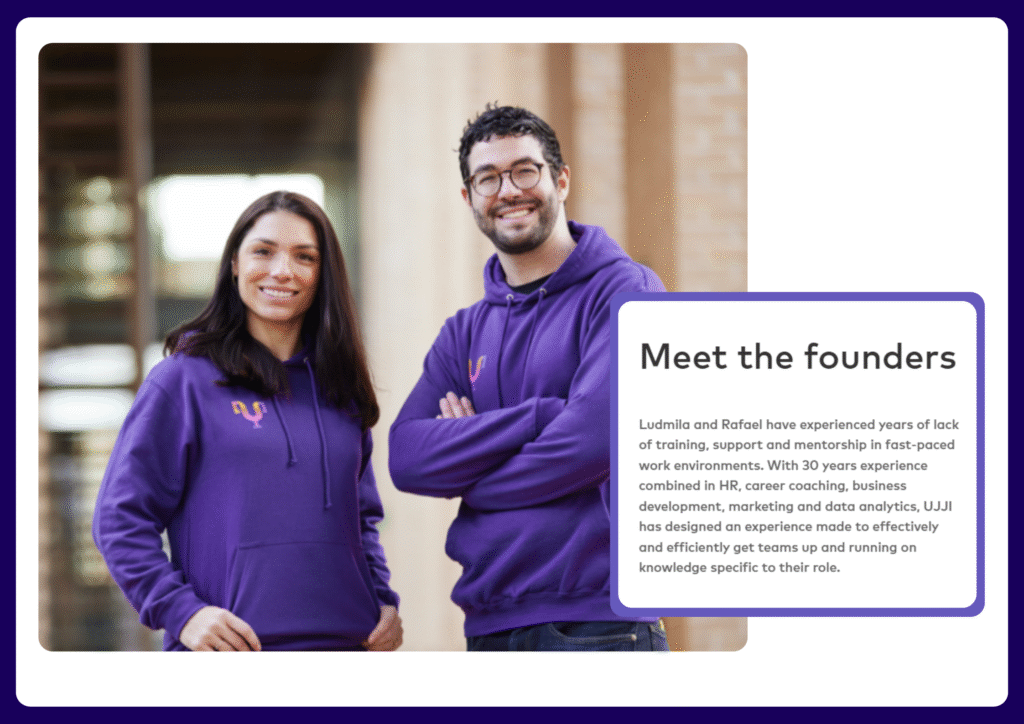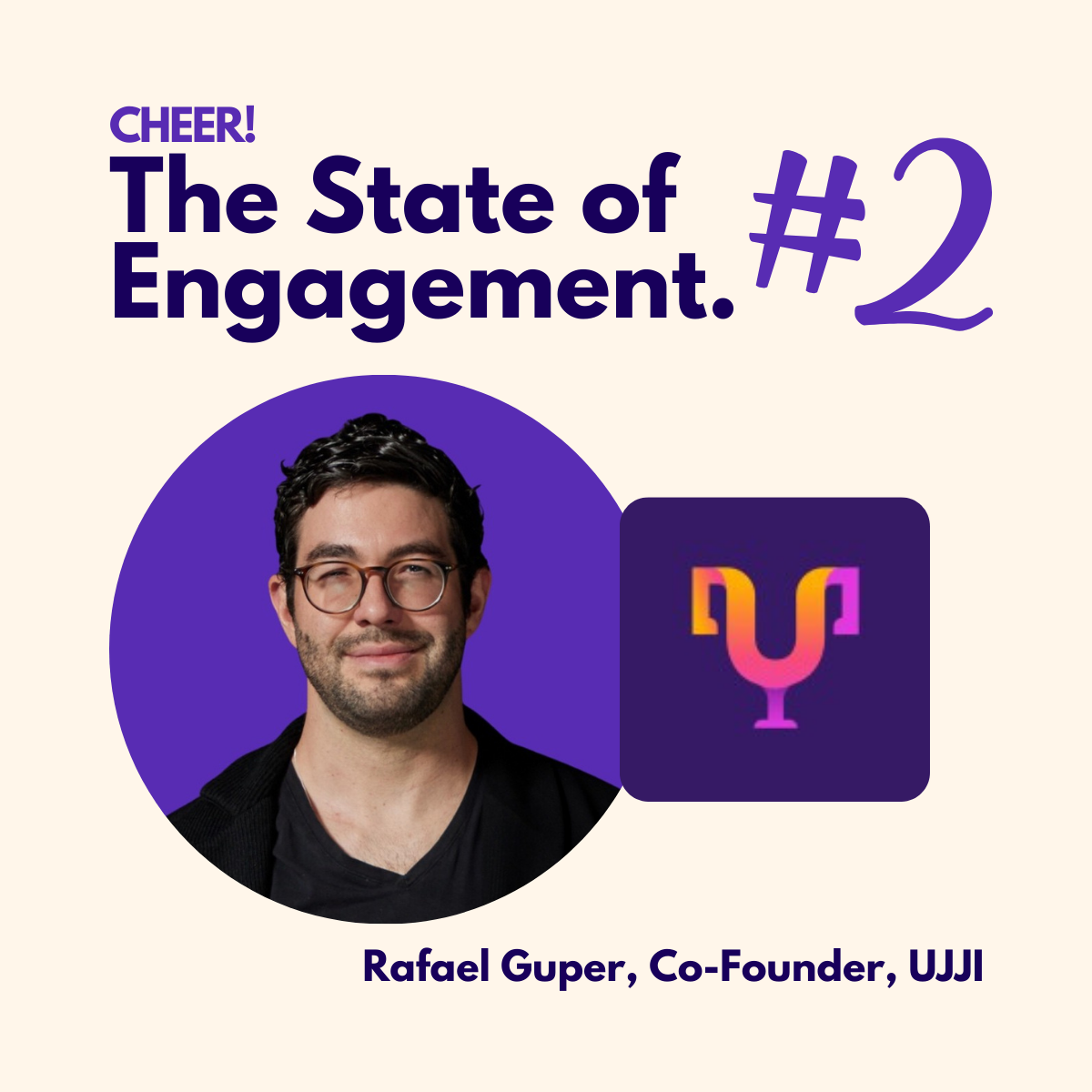The State of Engagement:
Rafael Guper, Co-Founder, UJJI
Welcome to the second part in a series of interviews with Founders / CEO’s / People and Talent leads of businesses who put people first.
This time on TSOE we explore the dynamic intersection of employee engagement, artificial intelligence, and the evolving nature of work. Our guide is Rafael Guper, a founder at Ujji.
Founded in 2020, UJJI AI is a start-up based out of Oxford. They turn dense company documents and operating procedures into micro-learning modules that are mobile, gamified, and neuroscience-informed.
They’ve built a workforce of around 50 employees, and – almost without even knowing it – they have unlocked the key attributes that drive employees: autonomy, purpose, and an opportunity to do better.
What engages your employees most?
“For us, it’s total autonomy,” says Rafael.
UJJI AI’s team isn’t measured by time at a laptop but by results – Measurable KPI’s – and their driven with this autonomy to get the job done. Their culture allows this to work.
“Our people love this”, he continues. “No matter how senior they are, or whether they’re leading a department or not, they have full autonomy over the processes they follow. They’re not bossed around, they’re trusted to do their job”
That freedom shows up in the day-to-day. The tech team, for example, runs weekly sprints they aim to wrap up by Thursday. If everything’s on track, Friday afternoons are more relaxed, or the team are done for the week. Flexibility is built into the rhythm of work at Ujji.
I was struck by Rafael’s emphasis on autonomy rather than ‘flexible work’. Flexible work sounds like choosing when you get things done, whereas autonomy is about trust, Confidence in people’s ability to deliver on their goals in their own way. Flexibility appears to be a by-product of autonomy.
What gives Ujji the edge in attracting talent?
Although it was tempting to suggest this was answered already, what is actually attracting people is the problem they’re solving. UJJIans have purpose.
“Most people we hire have lived the pain we’re tackling,” he says. “In previous roles they’ve wasted time reinventing the wheel, or written processes that are never used. Joining UJJI AI means working on something fundamental: taking knowledge locked in documents or people’s heads and making it accessible, interactive, and scalable.”
In your experience, what are employees looking for now?
The name UJJI comes from Sanskrit, meaning “to win and to help one in winning”, a fitting reflection of the culture Rafael and his team are building. He believes ‘winning’ isn’t the ‘Wolf of Wall Street’ or ‘hustle culture’ version, it’s winning via knowledge.
As he explained this to me, it struck me that UJJI’s culture had, without consciously aiming for it, aligned almost perfectly with the principles Daniel Pink set out in Drive.
Pink argues that true motivation comes from autonomy, mastery, and purpose. Ujji offers all three.
- Autonomy in how work gets done,
- Mastery through learning and achievement, and
- Purpose in solving a real, felt problem.
An interesting quirk, and perhaps part of why their approach resonates so strongly.
Which part of EVP matters most to you personally?
EVP, or Employee Value Proposition, is the balance of what people give and what they get back. I like to break it down into seven pillars:
Brand & Purpose, Culture, Environment, Monetary, Prospects, Relationships, and Wellbeing.
So what is the most important to Rafael?
Relationships top Rafael’s list.
“Building relationships builds the business,” he says, whether that’s through client introductions, referrals, or simply showing up on LinkedIn. He helps employees understand the importance of connection in growing personally, as well as the business.
Coming from a marketing background, Rafael pays attention to brand. He wants every employee to have the “UJJI language” so they can explain clearly the problem they solve and why they’re different, with their culture tying it all together.
What are your biggest people challenges right now
Two stand out. The first is helping people develop skills that AI can’t easily replace.
UJJI runs on AI, and Rafael is frank about the reality: roles that can be automated will be. His focus is on nudging people to build client-facing, relationship-based, or community-driven skills, areas where human judgment and creativity matter most.
Second, more with a talent attraction lens, is finding those who will “fly with their own wings,” Rafael says. That means encouraging decision-making, taking risks, and adopting a “forgiveness, not permission” mindset. Failure is expected; learning quickly is prized.

How do you think AI is impacting engagement?
For Rafael, the impact is unavoidable. AI is reshaping roles, and companies that ignore it risk leaving people behind. But he stresses the difference between AI literacy (knowing the tools exist) and AI fluency (knowing how to use them effectively).
“Everyone knows how to talk AI today. Not everyone knows how to do AI,” he says. That belief drove UJJI to create its AI fluency course, designed to help people weave AI into their daily work, no matter their function.
On that note, check out UJJI’s AI fluency course
Rafael sees this as both a challenge and an opportunity for engagement. Those curious enough to experiment with AI feel empowered; those resistant risk disengagement as tasks shift. The key is mindset. Being open, curious, and willing to try.
Final thoughts
What came through from this conversation is the clear link between UJJI’s culture and their product.
The company simplifies knowledge-sharing by turning heavy processes into something usable, and it manages people the same way. By stripping away rigid structures and replacing them with clarity, trust, and ownership.
Rafael demonstrated that Autonomy, relationships, brand, and culture aren’t abstract concepts. When they’re lived by a team both the team and the company thrive, and that’s particularly important in the fast changing AI world we’re living in.
For more on Ujji
Follow Rafael on Linkedin
Contact CHEER!
The People Championing Podcast

